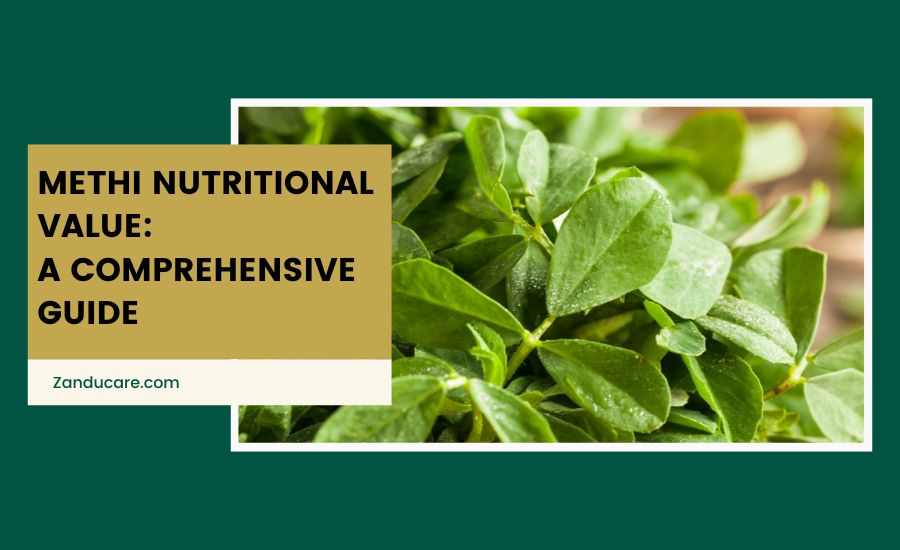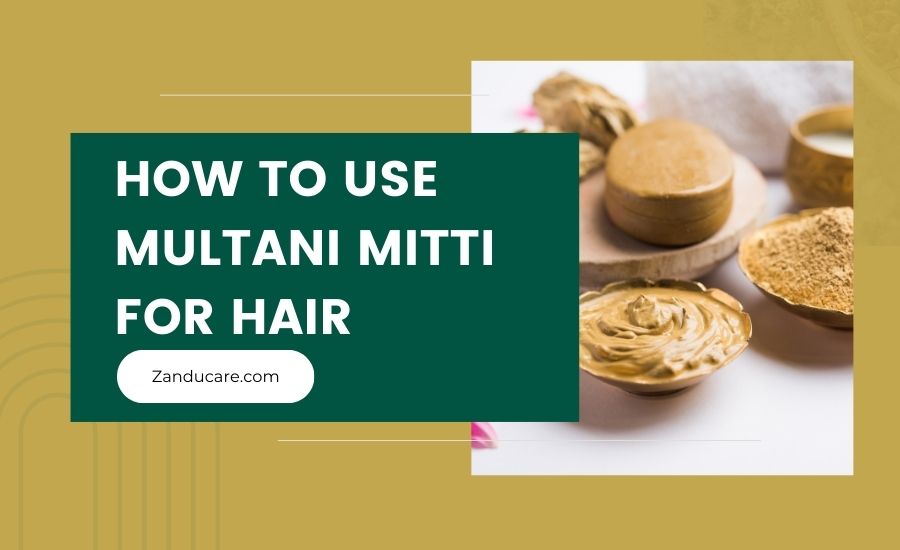
Methi Nutritional Value: Vitamins, Micronutrients & Minerals in 100g
|
Key Insights
|
Fenugreek, another name for methi, is a herb with tiny green leaves and seeds used in medicine and cooking. It is a mainstay of Indian cooking and has a somewhat bitter flavour. Methi, high in fibre, iron, and vital vitamins, has several health advantages, including facilitating lactation, controlling blood sugar, and assisting with digestion.
It frequently adds a unique flavour and nutritional value to various foods, including grinding powder, dried seeds, and fresh leaves. Methi has been prized in traditional medical systems for its possible therapeutic benefits and culinary use.
|
Did You Know?
|
Nutritional Values of Methi (Fenugreek)

Here’s the nutritional value of Methi (Fenugreek):
|
Nutrient |
Value |
|
Energy |
323 kcal |
|
Carbohydrates |
58 g |
|
Fat |
6.4 g |
|
Dietary Fibre |
25 g |
|
Protein |
23 g |
|
Vitamin B1 |
0.322 mg |
|
Vitamin B2 |
0.366 mg |
|
Vitamin B3 |
1.64 mg |
|
Vitamin B6 |
0.6 mg |
|
Vitamin C |
3 mg |
|
Iron |
34 mg |
|
Calcium |
176 mg |
|
Magnesium |
191 mg |
|
Phosphorus |
296 mg |
|
Manganese |
1.23 mg |
|
Sodium |
67 mg |
|
Potassium |
770 mg |
|
Zinc |
2.5 mg |
1. Energy (323 kcal per 100g)
Methi seeds are a great way to get energy. For people who need a calorie boost without consuming bad fats or sugars, methi is a great complement to meals because its calories help power the body's everyday functions. It is a nutritious dietary choice for preserving vitality because of its well-balanced blend of carbohydrates, proteins, and fats.
2. Carbohydrates (58g per 100g)
The body uses carbohydrates as its main energy source, and methi provides many of them(1). Methi is unique because of its high fibre content (which we'll discuss later), ensuring that the carbohydrates are broken down gradually and provide long-lasting energy without raising blood sugar levels.
Methi is an appropriate diet for people with diabetes because of its gradual release of energy, which aids with blood glucose regulation.
3. Fat (6.4g per 100g)
Methi includes certain fats, but they are good fats necessary for many body processes. The absorption of fat-soluble vitamins, such as A, D, E, and K, depends on fats.
Because it contains unsaturated fats that help lower bad cholesterol, methi's fat content promotes heart health.
4. Dietary Fibre (25g per 100g)
Methi is a dietary fibre powerhouse that is essential for gut health. Fiber promotes gut health, eases constipation, and facilitates better bowel movements. Additionally, fibre improves satiety and blood sugar regulation by slowing down the digestion of carbs.
Because it prolongs feelings of fullness, this can also aid with weight management by reducing total food intake.
5. Protein (23g per 100g)
Methi has a noteworthy 23g of protein per 100g, which is fairly high. Proteins are necessary for generating hormones, immune system function, and muscle repair. For vegetarians and vegans, adding methi to their diet can help them reach their daily protein goals.
Additionally, proteins support healthy hair, encourage cellular repair, and preserve the skin's flexibility.
6. Vitamins in Methi
- Vitamin B1 (Thiamine, 0.322 mg per 100g): Thiamine helps convert food into energy. It also supports nerve function and muscle health. A deficiency in vitamin B1 can lead to fatigue and weakness.
- Vitamin B2 (Riboflavin, 0.366 mg per 100g): Riboflavin supports overall cell function and helps break fats, carbohydrates, and proteins. It is also known for maintaining healthy skin and eyes.
- Vitamin B3 (Niacin, 1.64 mg per 100g): Niacin is essential for the nervous system and maintaining healthy skin. It also helps lower cholesterol levels.
- Vitamin B6 (0.6 mg per 100g): Vitamin B6 is vital for brain development and maintaining proper nervous and immune system function. It also helps produce serotonin, which improves mood and reduces symptoms of depression.
- Vitamin C (3 mg per 100g): Though small amounts, vitamin C in methi helps boost the immune system. It also plays a role in collagen production, aiding in wound healing and maintaining healthy skin.
In addition to this, now you can buy Methi medicines at the best price in India from our website "zanducare.com".
7. Minerals in Methi
- Iron (34 mg per 100g): Methi is rich in iron, making it an excellent food for combating anaemia. Iron is essential for the production of haemoglobin, which carries oxygen to various parts of the body. Women, in particular, may benefit from methi’s iron content, as it helps replenish iron lost during menstruation.
- Calcium (176 mg per 100g): Calcium is vital for maintaining strong bones and teeth. Methi’s calcium content helps prevent bone-related issues like osteoporosis, especially in post-menopausal women.
- Magnesium (191 mg per 100g): Magnesium plays a key role in muscle function, regulating blood pressure, and supporting the immune system. It also helps in energy production and controlling blood sugar levels.
- Phosphorus (296 mg per 100g): Phosphorus works with calcium to build strong bones and teeth. It is also involved in producing DNA and RNA, which are essential for cell growth and repair.
- Manganese (1.23 mg per 100g): Manganese supports bone development, wound healing, and the metabolism of carbohydrates, amino acids, and cholesterol.
- Sodium (67 mg per 100g): Sodium helps maintain fluid balance in the body and supports muscle and nerve function. However, methi has a relatively low sodium content, making it heart-friendly for those monitoring their sodium intake.
- Potassium (770 mg per 100g): Potassium is essential for heart health, as it helps regulate blood pressure and reduce the risk of stroke. Methi's high potassium content makes it an excellent food for maintaining cardiovascular health.
- Zinc (2.5 mg per 100g): Zinc is important for immune function, wound healing, and DNA synthesis. It also supports skin health and the proper function of taste and smell.
Other Nutritional Components
- Antioxidants: Methi is rich in antioxidants, which help protect the body against oxidative stress. These antioxidants fight free radicals, preventing cell damage and reducing the risk of chronic diseases like heart disease and cancer.
- Saponins: These natural compounds in methi help reduce cholesterol levels by promoting cholesterol excretion in the body.
- Alkaloids (Trigonelline): Trigonelline, an alkaloid in methi, has shown promise in regulating blood sugar levels and improving insulin sensitivity, making methi beneficial for diabetics.
How to Use Methi?

You can include methi, or fenugreek, in your diet to reap its health advantages. One popular technique is soaking methi seeds overnight and consuming them in the morning without food. You may add methi leaves to salads, sautés, or curries for a tasty and healthy addition.
Methi sprouts can be added to sandwiches or wraps, and methi powder can be sprinkled over food. Methi seeds may also be ground into a powder and used in smoothies or cooked as a spice. Try incorporating it into your meals differently to take advantage of Methi's many nutritional benefits.
Also check:
Side Effects of Methi
Although methi (fenugreek) has many health advantages, taking too much of it can have negative effects. Some people may encounter digestive problems such as bloating, gas, or diarrhoea. People with certain illnesses, such as asthma, may be more susceptible to allergic reactions. Methi should be used with caution by pregnant women because it may cause uterine contractions.
Additionally, people on diabetes drugs should keep a close eye on their blood sugar levels because methi may drop them. Meth must be taken in moderation and under a doctor's supervision, particularly if you are taking medicine or have underlying medical conditions.
Precautions to Take Before Methi (Fenugreek)
Take these precautions before adding methi (fenugreek) to your regimen. You might have a methi allergy if you have a legume or chickpea allergy. Because of its possible impact on uterine contractions, pregnant women should speak with their doctor.
Methi may cause blood sugar levels to drop. Thus, people with diabetes should regularly check them carefully. See a doctor since Methi may interfere with several medications, particularly if you are on blood thinners or diabetes treatments. Start with modest dosages and monitor your body's reaction because excessive use can result in digestive problems.
Interaction With Other Drugs for Methi

It's important to know possible interactions between methi and other medications. Methi can increase the risk of bleeding by intensifying the effects of blood thinners like warfarin. Additionally, it might intensify the effects of diabetes drugs, which could result in hypoglycemia.
Furthermore, it's best to take prescriptions at least two hours apart from meth use because meth may affect how well some medications are absorbed. To be sure there are no negative effects or interactions that could jeopardise your health, always get medical advice before including methi in your diet, especially if you are taking any drugs.
Conclusion
Methi, often known as fenugreek, provides a variety of nutrients that support general health. It is vital in maintaining digestive health, enhancing cardiovascular function, controlling blood sugar levels, and promoting skin and hair health. In addition, it is a fantastic source of energy, protein, and necessary vitamins, minerals, and fibre.
It is a functional food that is simple to include in a balanced diet because of its high fibre and antioxidant content. Whether you eat methi seeds, leaves, or supplements, it's a superfood that works well in many different recipes and has many health advantages.
FAQs
1. What is methi a rich source of?
Fenugreek seeds contain choline, vitamin A, vitamins B1, B2, C, nicotinic acid, and niacin.
2. Can I eat methi daily?
Many people can benefit from consuming moderate amounts of fenugreek seeds regularly. However, specific medical problems and possible drug interactions must be taken into consideration.
3. Is methi good for bones?
Previous research has proposed some ways that fenugreek aids in bone repair. Increasing calcium levels outside of cells and encouraging osteoblast formation regulates osteogenic indicators and enhances osteoblast differentiation.
4. What is the best way to consume fenugreek?
Add one teaspoon of fenugreek seeds to a glass of boiling water and let them soak for ten minutes or so. After straining, flavour your hot tea with lemon and a dash of honey.
References:
- The body uses carbohydrates as its main energy source, and methi provides many of them.(https://www.ijabbr.com)
- Methi includes certain fats, but they are good fats necessary for many body processes. (https://www.ijabbr.com)
- Methi is a dietary fibre powerhouse that is essential for gut health. (https://www.ijabbr.com)
- Methi is rich in antioxidants, which help protect the body against oxidative stress. (https://www.researchgate.net)





Leave a comment
This site is protected by hCaptcha and the hCaptcha Privacy Policy and Terms of Service apply.